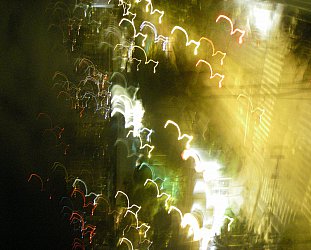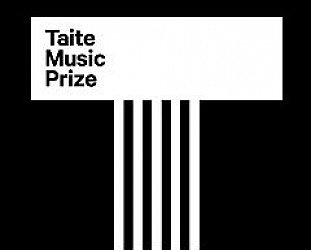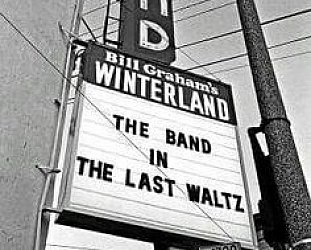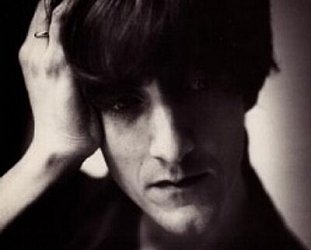Graham Reid | | 13 min read

Campbellhad a directness that Dennis had once mistaken for the dourness of the Scots.
“You’ll be wanting home, then?”
“Yes, just for a fortnight . . . perhaps three weeks . . . I can pass on the Peebles brochure to Meg and the old Strathaven history could go on hold until I get back . . . Iain has still got something else to add anyway so there’s not much rush for my bit.”
“Aye,” said Campbell thoughtfully, “That’ll do us well. What is the Strathaven like?”
“Oh, fine. It’s that Shadow in the Glass thing, glass like a looking glass, a mirror . . . Just a family biography, but quite interesting I think.”
“Aye.”
A long pause.
“Does he have the Gaelic, do you know?”
Dennis groped for an answer, the question was unexpected.
“Ah . . . I don’t know . . . Ah, no he doesn’t, he told me when he first brought in the dummies.”
“No matter I suppose, there’s many that don’t have the language anymore. Well, three weeks then? But you look to your family Dennis. We can cover here.”
“Thank you Campbell. I’ll let you know if things get . . . difficult.”
“Fine, fine. But you look to your family, mind.” He offered Dennis his hand, held it hard then took himself into the outer office to busy himself away from the awkwardness of the moment.
Dennis took off his glasses and held them heavily in his hand. He looked out at the white square below. The winter afternoon was already taking on the dull blue of the early sunset. And half a world away his family was in the darkness of night.
The irrelevance of the question puzzled him on the long flight, it punctuated his fitful dreams: “Does he have the Gaelic?”
And the more he thought about it, the more guilty he began to feel. He should be thinking of Warren and the events of home. The question spun inside him, nagging in its emptiness.
He struck up a brief conversation with the couple next to him, a high school principal from some South Island town and a prissy woman who described herself as “his wife”. Oxford, she assured Dennis, was extraordinarily beautiful, and she seemed stunned that he could have lived so long in “the United Kingdom” and not have been there.
Her husband was disappointed that London wasn’t at all like it was described in those HV Morton books.
“Those punks were a big shock,” he offered later on. “Someone’s got a problem on their hands with that mob.”
His wife nodded.
For the first time in many years Dennis remembered with sad anger the New Zealand conservatism and how effortlessly it had translated into political thuggery. It was one of the things that had made him leave. It surprised him that he could have forgotten so easily.
He feigned sleep, the question and thoughts of Warren and home swam in his head, kept awash with a steady flow of drinks. Finally he slept as continents and oceans hummed by invisibly beneath him.
He arrived two days after the funeral and lost himself in the stream of friends and relatives who called at the house. Talk rarely centred on Warren, and somewhat self-consciously Dennis realised that his return was a more comfortable event for people to hide in. He answered the same questions over and over.
Julie helped him escape to her place a few afternoons and he played with her kids, drank Mike’s beer and slept in front of television on the couch.
One night after about a week he stood looking out of his bedroom window onto the back lawn. His old bike was leaning against the side of the garden shed. Julie’s kids owned it now. He looked at the muddy tyre tracks framed in the square light from the lounge window, how they led off into the darkness of the lawn. He knew the ride: from the shed down the path, round the lemon tree, across by the hedge, round the pear tree ducking to miss the low branch. And the quick sprint back to the shed pushing against the slight incline. Twenty-four seconds.
He jerked a laugh into his throat. So long ago. It all swam together without pattern.
He rested his head against the cool glass of the window. And he listened to his mother busying herself desperately in the other room.
He was home.
A few days later, driving the length of Princes Street, drifting a little as he thought about seeing the lawyers, he remembered the place that served him so well at university. He circled sharply and out of curiosity headed back towards Shortland Street. And there it was.
He smiled inwardly and felt the familiarity of backing the car into the narrow space. As he locked it he saw his mother’s umbrella on the back ledge. He smiled again. All habits. The parking space always there, his mother putting an umbrella in every car she had. Comfortable habits . . .
He walked into the city and looked with what he thought was indifference at the new skyline and the buildings there. The changes forced him to remind himself of what he’d had to think in every place he’d been over the years: not better, not worse, just different.
But something in all this pushed deep.
He mentioned it to Bill later that afternoon.
“Yeah, shit! It’s changed all right!”
Bill roared and leaned back in his huge chair, hoisting his feet onto the rim of the wastepaper basket.
“Those short-term money boys have just torn the bloody place apart. Okay, it looks shitty most of it, but I’ll tell you this, there’s money around these days that wasn’t there when you pulled out . . . And I think we’ve got them to thank for it. These last three years have just been up and up.”
Dennis stared hard at him. Bill was a difficult one to figure sometimes. At university he’d always had a couple of joints in his pocket and his hand on some girl’s knee; just a wild loony who could honestly boast he’d never read one of his sociology texts.
Then he’d quit the place in the middle of his second year and fallen back on the two true skills he had: design and bullshit. And with wild fervour he’d become one of those lapsed hippies, a bag full of liberalism and “screw the other bastard”.
Dennis remembered how he’d gone off Bill pretty quickly around that time. Then Bill had left for Wellington, a couple of years in an agency, a year or two in Melbourne, a little something in Sacramento, and then they’d met up again in London when Dennis was there the first time.
They’d hit it off surprisingly well. Bill had “made a bloody bundle in the States” and was on his way home looking to open up his own agency. He’d done well.
Bill continued to talk while Dennis thought this chain of biography through.
“And then we pulled a couple of bloody good accounts, held them last year, and now this government’s just clearing the way for us.”
He was unstoppable, the figures rolled up but meant little to Dennis. They sounded impressive enough, he leaned back and listened. Bill was still a bullshitter, but Dennis could sense he was on the tail of a truth.
“. . . and then a couple of years ago this high-flier from the States came over and what he said was right. You’ve got to get out of this ‘stable government’ shit. It wasn’t that it was bad . . . Okay, it was bad!”
They laughed at his foolish qualification.
“Yeah, but look back and the point is that the big changes happen when one lot gets out and the other lot comes in. Keep the ground shifting, the rules changing, and in this business you’re home free.
“Just look around. Dave and I pulled this together in five years, but for the first two it was bloody tough. These last few have been over the top.”
The pause was meant for Dennis to fill.
“You haven’t changed a bit, you bastard! You just picked a smaller pond to be a bigger fish in.”
“Exactly my man!” he roared again. He was impossible to dislike now, his bearishness and expansive honesty were just what Dennis wanted to see.
“Come on, let’s get a drink.” Bill was on his feet in an impulsive rush of movement. “You still in this game or what?”
“Still in it. A bit lower key though, small contracts, some nice layouts for a couple of good publishers and a few steady Tourism Department things . . . A good living.”
Dennis felt acutely self-conscious the second he said it. It was exactly the weak justification that he’d feared he would make one day.
“To hell with making a living boy, you wanna live!”
Bill suddenly dropped his voice to an uncharacteristic whisper as he gathered up his jacket. He shot a glance at the closed door.
“Tell you what boy, you buy the drinks and I’ll offer you a job. There’s a woman here whose not bloody cracking it and I’m looking to dump her after she drops this.”
He gestured to a file and layout on the desk.
As they reached the foyer Bill held the glass door open for him and put his arm on Dennis’ shoulder.
“Did you know that Ellen is back?”
Dennis turned and looked directly at him, scanning his face for the flicker or smile.
“No. True, been back about three months. She knows you’re home too. We’ll get together on the weekend sometime if you like.”
Dennis was silent as they stepped into the hot summer afternoon and walked up the narrow side street to the corner. The world was reaching out to embrace him. And he welcomed it.
The next evening when he came home from Ellen’s his father nervously took him aside quickly.
“Ahh . . . your Mum is a bit upset, just a bit too much for her today I think. She’s having a lie down in the lounge. Nothing to worry about . . . I think we’ll just let her rest for a while . . . But I’ll go and sit with her . . . Nothing to worry about . . .”
And he closed the door behind him carefully, leaving Dennis alone in the silent house.
He went and stood in the kitchen and looked out into the long afternoon. The sun was still high. The hard light, the garden, the bike tracks. The dry green and warm breeze.
He stood there alone for a long time, resting his weight on the sink bench.
He’d never really known Julie’s husband Mike. They’d married just after he’d left and had seen little of him before that anyway. But in the three weeks since “what happened to Warren” they had become quite close. Both shared the feeling of being outsiders in the family tragedy, and even though they had little in common, they felt entirely relaxed in each other’s company. And as Dennis had used Julie’s place as a kind of refuge he’d drunk more of Mike’s beer and they’d loosened up with each other quickly.
One Sunday they’d got hopelessly drunk together at a thrown-together barbecue and Dennis had noticed that both Julie and Ellen just let them get on with it. Julie needed them to be close. Ellen knew. They all needed the release. A necessary evening.
They ended up paralysed with laughter listening to bits of a Billy Connolly CD while Dennis added his own Scottish stories . . . Just a simple pleasure.
Two days later he went into Onehunga with his father to get some things and pick up some wine to take to Ellen’s. He was lifting a carton from the boot of the car when his father stumbled for the words he knew he had to say.
“You know, we’ll be fine if you want to go back now . . . It was good of you to come all this way, but your mother and I, well . . . You know . . . Maybe you’ve got something back there that you need to be there for . . .”
He tailed off. The reassurance that he so badly wanted to give couldn’t come, the words fragmenting under the weight of the moment.
Dennis started to reach for words but fell back into an inarticulate vagueness. Closeness came hard, even now.
That afternoon he called Campbell in Edinburgh.
Julie and he started to clear out Warren’s flat one Thursday morning, and he paid the rent for another fortnight. He put the key in his pocket.
At lunchtime on the Saturday he excused himself from the house and went back. He sat in the bare lounge and looked at the white painted bricks of the wall. It was an ugly room.
He found a piece of fuse wire and wound it into shapes all afternoon. He’d been home exactly five weeks.
Ellen pushed her arm beneath his and round his waist.
“Enjoying yourself?” she half-shouted above the music.
Dennis laughed, laughed for the care in the question, for how unnecessary it seemed. He put down his glass and turned to her.
“You know, I haven’t been to a party like this since I was in Sydney . . . With you in fact!”
He laughed again: “All these people. It’s probably the first time in about five years I’ve been in room where I’ve known everybody. It’s great.”
He looked through the French doors opposite, standing open to the late evening, and saw the barbecue still burning. The warm figures caught in the half-circle of orange light. A party with the doors open. With friends.
Ellen pulled him close to her and leaned towards his ear. “I love you, you know,” she whispered and kissed him on the cheek.
For 10 years they had been friends and sometime lovers. Here, in Sydney, for a few months in London. Nothing ever much changed between them. They’d gone their separate ways. But they had never been separated.
“I love you too.”
And as he kissed her gently they became alone in the midst of the crowded room.
For as long as he could remember he had always left parties. The forced levity of some made him seek escape. Sometimes he just wanted some air, sometimes to think. It had become a habit: five minutes, 10 minutes.
He stood on the doorstep looking over the line of cars in the driveway, one bare streetlamp illuminating their roofs and glancing off the ferns up the side of the path. Behind him someone had put on Honky Tonky Woman again. Good-natured disapproving shouts turned into raucous singing.
He stepped onto the path and walked slowly towards the gate, and for the first time recognised the street. The name eluded him but he knew it well enough. He’d never come to it the way he had tonight, from Ellen’s. He’d always approached it from his parents’ house off in the other direction. And he couldn’t think of the last time he’d been here.
Primary school perhaps, because his old school was just across the intersection.
He remembered how he and Warren had ridden their bikes along the thin street now buried by motorway and onto this main road.
He walked to the high stone gate of the old school, its motto tattooed into the broad wooden beam at the top. Valour Through Challenge? Victory Through Challenge? Something like that, some pithy pre-war slogan that spoke of correct values.
But before the words came into focus in the night he was upon the change.
The swimming pool he expected to see over the low stone wall wasn’t there. In its place was style-less single storey glass and weatherside building. The strangeness of the outline, the unexpectedness of it, caught him by surprise.
He walked down the stone steps onto the playground. To the left was where the primers’ block had been with the wooden bike shed beneath. The cruel spotlights of the play area picked up a large adventure playground and an area of asphalt. The building was gone.
Ahead, where the stone two-storeyed standards classes and staffroom had been . . . Gone too. The flagpole, the library, the prefabs where the reading room had been . . .
He felt lost.
It was here, here where he had stood once and waited for the nurse to fix the cut in Warren’s forehead. This is where the boys’ toilets had been. Michael Peters pissing over the wall. The bike shed. Warren putting his bike in a wooden rack. Standing in the corridor waiting for the strap. Line up outside the hall. The Fun Doctor coming in his Austin A30 to give a free show. Mr Stanley. The project he and Warren had done on coffee growing. The model they’d made.
The top field over there.
Gone.
Buildings. The bank down to the lower field. Touch rugby. Where Warren had scored his first try. Bee stings. Eating nasturtiums. Where Warren had run and played.
He sat on the steps of the low modern building for a long time. Then got up and rested his head against the glass of the door. And listened to the darkness.
He stood at the end of the drive looking over the line of cars. In the sharp light of the lounge he could see Ellen. She was talking to someone whose face he couldn’t see. As he watched she lifted her long dark hair and flicked it lightly, naturally, over her left shoulder.
It was gesture he had seen her make so often, and in the smallness of the movement he was consumed by love. A deep and despairing need that came from his own emptiness.
He looked down and caught sight of his face reflected in the windscreen of the car, an outline hardened by the coarse glare of the streetlamp, one side of his face only, reflecting back at him in the glass, strangely white. The other side of his face was not there at all. It merged into the blackness of the deep space behind. He was a thin shadow in the glass. Half of him gone.
Behind his was the playground, long since passed. He looked again at his reflection. Shadow in the glass.
The tears came freely to him at last. For all he’d lost. For himself. For the whole strange pattern of it all.
His mother crying in the hollow night. Ellen in rooms they’d known. Tyre tracks leading into darkness. That winter morning far away and the message.
The bare brick wall. A twist of wire and voice he could no longer hear.
He didn’t have the language anymore.
He was wanting home.
This story appeared in Metro magazine, and subsequently in a collection of Metro Fiction. Illustration by Danyel Simich
© Graham Reid







post a comment